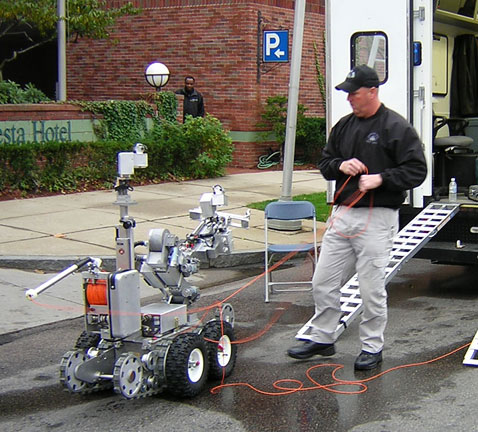Boston Police: We didn’t ask Cambridge to ‘step up’ bomb squad for marathon
![]()
The Boston Marathon bombing and that city’s security needs during the upcoming anniversary were invoked last month by Cambridge police to get nearly a half-million dollars toward creating a full-time Cambridge Police bomb squad and beef up an existing Special Response Team and Tactical Patrol Force.
Boston police, though, said they knew of no request to Cambridge for help.
When Cambridge Police Commissioner Robert C. Haas asked city councillors Dec. 17 to transfer $485,000 from the city’s free cash fund for five more officers and five bomb-sniffing dogs, a move they approved unanimously, then-councillor Minka vanBeuzekom asked why the money couldn’t wait until the regular budget cycle. Haas gave two answers, including:
There was an urgency placed on ramping up the explosive ordinance disposal teams … The goal for Boston was to have these assets in place in time for the next Boston Marathon, and that’s why it was expedited. I didn’t expect to see these dogs for another 18 months, but because of what took place this last April they wanted to step up that program and have these assets in place by the next marathon.
Haas’ language was vague and left room for believing the urgency was a Cambridge initiative, but his comment that “they” wanted faster action begged for clarification.
Boston Police were asked the next day for comment – the specific question was “Did Boston signal to Cambridge’s police that a full-time bomb squad would be wanted by the date of the coming Boston Marathon?” – and replied Dec. 19:
“As of this date, there are no credible threats to the marathon. To my knowledge no signal was sent to the Cambridge Police,” said Sgt. Michael McCarthy, of the Boston Police Department’s Bureau of Public Information.
No reply in Cambridge
Cambridge police were asked similar questions via email the same day. When contacted by phone Dec. 26, a police spokesman said no email had been received; the same email was sent again asking to whom Haas referred in his comments and how the request for a full-time bomb squad had been made. When no reply came, additional voicemail messages were left with the department’s public information office, including on Tuesday and Wednesday. By the end of the business day Thursday, there had still been no reply two weeks after the initial confirmed request for information.
The April 15 bombing brought massive local, state and federal law enforcement presence to Boston and prompted hundreds of “suspicious package” alerts in Cambridge from residents suddenly worried about finding bombs. Because of the attack, subsequent alerts and April 18-19 manhunt for suspects Dzhokhar A. Tsarnaev and brother Tamerlan Tsarnaev, of Norfolk Street near Inman Square, Cambridge police worked 16-hour shifts for days on end, Haas has said.
On the day Haas spoke to the council, there had also been a bomb scare at Harvard. The six-hour incident brought in mutual aid that officials said included the Department of Homeland Security and so-called Department of Homeland Investigations, federal Bureau of Alcohol, Tobacco and Firearms, FBI and police forces from Harvard, Boston and the MBTA in addition to Cambridge officers and firefighters. Four Harvard buildings were searched with 16 dogs, none of which belonged to Cambridge.
The apparent success of mutual aid prompted vanBeuzekom to press Haas on the question of timing, and he gave a second reason for the $485,000 disbursement:
If we don’t take advantage of the grant funding, we’re going to be leaving $1.1 million on the table. And then we won’t have that money to start that program when we’re ready to do it … we’re being presented with a $1.1 million grant to purchase the dogs, train the dogs and provide the necessary initial assets including the vehicles and the equipment to set up this team. That would be a cost that would be borne by the city if we weren’t to take advantage of this grant to the sum of $1.1 million. And then our plan is to in [fiscal year 2015] absorb the cost of that unit, which includes those five additional officers.

Cambridge police personnel roll out a remote control vehicle at a 2005 bomb threat near the Cambridgeside mall. (Photo: Douglas Heulitt)
“This is to start up the program,” he said.
The email and phone calls to Cambridge police included questions about the grant. With no reply, the breakdown of expenses for the $1.1 million is unclear. The city already has one of only four bomb squads in the state, Haas said, along with Boston, MBTA and State Police – but the squad, although already trained, equipped and with access to remote-control bomb robots, works part time rather than full time.
Reports of the cost per dog – including an animal, its training and the vehicle that will carry it – vary widely, with Arlington, Texas, officials saying in March the cost was $130,000, suggesting Cambridge could spend $650,000 on five bomb-sniffing dogs, while the Hoboken, N.J., police force got a $105,000 Homeland Security grant about six months ago that included not just the cost of a K9 that would detect explosives, but the cost of the police officer who would handle it.
Aside from vanBeuzekom’s questions about timing, none of the nine councillors asked any questions of Haas or City Manager Richard C. Rossi about the fund request.
The council has a history of passive responses to police matters. Former city manager Robert W. Healy, before retiring last summer, claimed powers as “chief conservator of peace within the city” as laid out in its Plan E charter.
This post will be updated if Cambridge Police respond to the email sent in December or subsequent requests for information.

